She/herDad is a feminine pronounIm a game dev and a writer so ask me about my dark work
Last active 4 hours ago
Don't wanna be here? Send us removal request.
Text
I started a silly project and forgot to post my poll for what you guys wanna see next, so… here it is!
#writing#fantasy#worldbuilding#magic#creative writing#ttrpg#city planning#magic system#magic user#effective horror#tv writing#movie writing#writer#horror writing#writing advice#fiction writing#rpg#dm advice#dungeon master#ttrpg community#unfiction#illustration#narrative podcast#prop design#game developers#d&d#dnd#horror fiction#horror#character
1 note
·
View note
Text
Multimedia storytelling!
Although it sounds like some nonsense corporate jargon designed to sell more AI waifu apps to kids, its kind of my main deal and what i intend to one day make my full time job. This post is going to roughly explain what it is, how i do it, some ways you can apply it to your own work, and some cool examples of multimedia stories that i really like.
So: multimedia storytelling is exactly what it says on the complicated non-euclidian tin. It is a method of storytelling in which the author combines multiple mediums of art to tell the same story. I tend to apply this mostly in the form of a single setting in which multiple stories of different mediums (podcasts, roleplaying games, short, short stories, books, drawings, ect.) take place. The most common multimedia stories are a bit less complicated than that: a comic book that goes along the story of a video game and adds some details, augmented reality games that follow analog horror series, and movies or shows that take place in the universe of a video game or book are decently common these days and are pretty solid examples of multimedia stories.
Infamous (2011) was a video game that had a comic series along side it that added details and expounded on empty moments in the games.
Payday 2 (2013) was a video game that had a live action trailer series that basically became a small tv show for awhile
Uuuh five nights at freddys? Has books? I think that counts
Dungeons and Dragons (please hear me out) has the TTRPG, the MMO, the movie (Honor Among Thieves), and several video games in its setting
The Magnus Archives (2016) is a podcast with a tabletop roleplaying game
The way i put together multimedia stories is very much the D&D way of things. I read a bunch of the Dragonlace books at a super young age and it got me into the whole “one world, one hundred stories” way of thinking, from that point on all of my writing followed that sort of path, multiple narratives in the same setting, occasionally these stories crossed over or took place regarding the same events and sometimes they didnt.
Then ARGs happened. I love the sort of interactive storytelling ARGs employ, websites, videos, phone numbers you can actually call in some cases its just so fun and engaging.
So! What I do is as follows:
I build my setting, writing pages and pages of world building so that all of my stories have a setting bible to cling to.
I start planning stories, if one would do better in an audio format i go grab my microphone and write the script, if it would do better as a short film i grab a shitty camera and a group of friends and go film something.
I always, ALWAYS, build a tabletop roleplaying game that fits my setting, i dont change my setting to benefit game design, i simply make the game fit my world. If i like how the game came out i force my friends to play it.
I then write as many short stories as i can, small stories about simple boring characters and large narratives about important events. If i like how one turned out i keep expanding on it until i cant anymore.
Now! The part you guys actually care about; doing it for yourself can be really hard, but only if you stretch yourself too thin. I only engage in art forms that i actively want to do if an idea feels like it would make a great podcast episode but i hate my voice that day im gonna just move on for the day.
If you want to draw something in your story draw it, dont force yourself to write it if drawing is what feels best that day.
Your art is at its best when you let it be what it wants to be.
If im only in the mood to write about merchants im just gonna write about merchants otherwise i could crush my love for the art entirely.
#writing#fantasy#worldbuilding#magic#creative writing#ttrpg#tv shows#tv writing#movies#movie writing#scriptwriting#podcast#narrative podcast#infamous#payday 2#fnaf#five nights at freddy's#dungeons and dragons#d&d#dnd#honor among thieves#baulders gate 3#ddo#dungeons and dragons online#dragonlance#world building#creative process#the magnus archives#tma podcast#tma
14 notes
·
View notes
Text
Ok! My last post did way better than I had anticipated, thank you guys so much!
That said:
#writing#fantasy#worldbuilding#magic#city planning#creative writing#magic system#ttrpg#magic user#effective horror#horror writing#horror fiction#horror#mystery#game developers#game designer#indie ttrpg#ttrpg community#arg#augmented reality game
3 notes
·
View notes
Text
All humans are born slightly claustrophobic and agoraphobic. We are all born with an understanding that too many things, too close together, is dangerous.
Anyways my favorite library was really busy today and I had a panic attack.
3 notes
·
View notes
Text
Effective horror is not easy to write. Horror and comedy are very similar in how they are executed however written horror can be far harder to land than written comedy.
In theory they both work in the same way:
Set up: a situation occurs in which the reader needs to begin to feel an emotion.
Tension: that feeling is held and elongated until youre ready to pay off those emotions.
Punchline: something big happens in which the reader feels the fullest extent of the emotion intended. This is the section where written horror will always suffer.
With comedy you can easily make a reader audibly laugh, with horror in a written form you will not be able to make a reader jump with fear. Writers cant rely on jump scares and a consistent ambient soundtrack like you can with a horror game.
So to write good horror you need to turn elsewhere, as you are rarely going to “scare” a reader. I learned this while running horror tabletop roleplaying games, specifically Call of Cthulhu, as players and readers are very similar concepts.
To scare a reader, your goal is to unnerve them and make them remember something that made them uncomfortable, uneasy, or anxious. They arent going to jump and scream, instead theyre going to second guess themself the next time they see a shadow move in their room.
To set up good horror I follow 3 simple steps:
Change your voice: the moment I begin to set up a scare I change my authorial voice, I use shorter more visceral words replacing “she wandered down the hall, her eyes drifting from place to place” with “she walked, quickly. Her legs shaking, her eyes running around the shadows”. This change tells the reader that something is amiss and they will unconsciously notice it.
Darkening word choice: this ones rather simple, I change my descriptions from standard to uneasy. “The couch was burgundy leather with pillows at each arm” to “the couch was a red leather, dark as blood”
Remember your theme: whatever the main monster, killer, or general spooky of your text is needs to be given credence in every scare. This drills the pattern of fear forward. If your killer uses a knife, describe the glint of moonlight as blade like. If your monster eats flesh, describe food in detail and relate your characters emotions to grotesque foods.
Remember, you arent going to get a scream. Your goal is to make your reader anxious, uncomfortable, and make them look at their day to day life differently
After all
Meat is Meat
If you want some examples, check out my horror rp blog @research-duck
#writing#fantasy#worldbuilding#creative writing#ttrpg#horror writing#horror fiction#horror#effective horror#scary#call of cthulhu#tma podcast#tma#the magnus archives
181 notes
·
View notes
Text
#writing#fantasy#worldbuilding#magic#city planning#magic system#creative writing#ttrpg#mystery#prop design#prop#puzzles#puzzle#ciphers#horror#horror fiction#horror writing
1 note
·
View note
Text
Character design is something I tend to struggle with, not character writing but design. I’m not an especially visual person, I tend to prefer the other senses for descriptive writing. I can describe people, their faces, their movements, their body shape, all of those things however to get to the point of description I need to first have a person to describe.
I figured I’d drop my process for how I design characters just in case anyone struggles in the same department.
Take your character concept and run it through these metrics:
• Think about your characters role and what you picture those traits looking like. Do you think Knights should have strong jaws and sunken eyes? Do you think a Journalist should have a kind smile? Look around for people with those facial traits and seek to mimic the rest of that persons features. A close friend recommended this to me.
• Tell your character concept to a friend and ask them to tell you what they think the character looks like. Not only will this give you a new perspective but it could also give you an entirely new lens on the character thats frankly better than what you had planned.
• Find an actor. Thats it. Just do a face rip. Maybe add a feature or two but its easy to just use one of the hundreds of millions of theatrical professionals in Hollywood and beyond.
Remember there are no rules. Anyone can be anything and they can look however you want them to.
#character#character design#writing#fantasy#worldbuilding#creative writing#fiction writing#writing advice#ttrpg
12 notes
·
View notes
Text
Ok! Sorry for the delay but you guys voted for Deep World Building for my next post topic so lets get into it.
The first thing you’ll inevitably hear when getting in to world building is “dont go too deep”, I hear this a lot especially regarding TTRPGs and to an extent I agree but I think the sentiment is phrased wrong. I think when people tell you to avoid going too deep, saying things along the line of “you dont need that information”, they’re missing a crucial detail that only you have access too.
Only you know what information you need.
Its easy for others to say that you dont need an indepth guide to the economic values of certain resources or the exact trade routes between locations because they simply dont know why you want it.
My general rule of thumb for world building on a micro scale is, “if I’m excited to write it, i deserve to write it”.
Now for some tips and tricks!
I use an app called Obsidian to manage all of my settings and their details, think of it like personal Wikis for your concepts that can be connected to other concepts via links. I think it helps me find spots that aren’t filled in, if I made a link and it doesnt contain anything yet, I try to fill it out before the days over.
Obsidian is helpful because you can use it to make sure certain concepts remain connected in a way thats convenient and visual.
Remember that in a world of interconnected concepts not everything will connect to something else but when things do connect try to make sure that that connection is mutual.
For example:
• iron is worth more in a city with only farm land, what does the city do to get iron? How expensive is it? How is that price effecting the citizens?
• minority communities in a city often have close relationships to one another, and are often over policed. What does that over policing look like? How does it affect the economy, crime rate, and outside perspective on the city and those communities
• why does the nation youre writing prefer horse travel over ships? How does that effect their merchants abilities to make money quickly? What goods are sold out of this country now that their travel takes far longer than it would by boat?
• you’re magic system requires consistent use of a consumable resource, like a potion. How does this effect the economic profile of magic users? How does it affect the forests where those resources are harvested? How did people discover this potion and what was it originally meant for?
(Here is Obsidians graph for one of my settings)
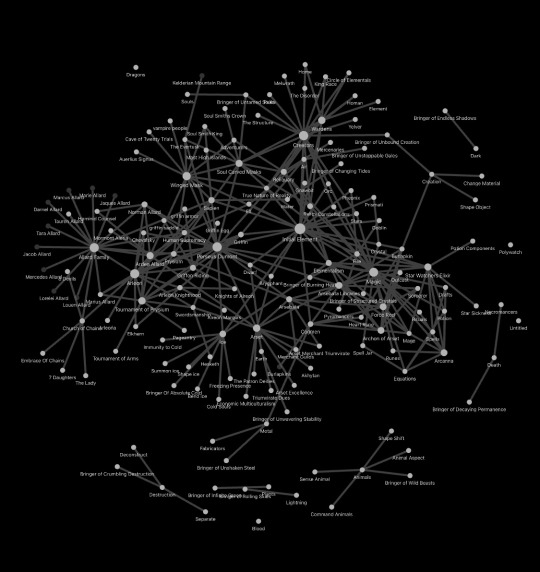
#writing#fantasy#worldbuilding#magic#city planning#magic system#economics#fantasy economy#urban fantasy
9 notes
·
View notes
Text
baby dragons whose scales are much more shiny and iridescent in order to hide in their parents' hoards
70K notes
·
View notes
Text
reblog if you support:
• pre- or non-hrt trans people
• genderfluid/non-binary people who want hrt
• genderfluid/non-binary people who don't want hrt
• pre- or non-op trans people
• tall transfems
• short transmascs
• fat/plus size trans people
• fem trans men
• masc trans women
• transmascs who don't/can't/won't bind
• transfems who don't/can't/won't tuck
• transfems with wide shoulders
• transmascs with wide hips
• genderfluid/non-binary people with facial hair or tits
• genderfluid people whose presentation is static but their gender is not
• non-binary people whose desired presentation is how society says their agab should present
• transmascs who bind but still have a visible chest
• non- conventionally-attractive trans people
• non-conforming trans people
• non-"passing" trans people
• non-stereotypical trans people
We don't all fit into cisnormative society's bullshit stereotypes!
I'm trying to prove a point to some transphobic relatives. Back me up tumblr.
26K notes
·
View notes
Text
I dont know what to write my next post about, help me out?
1 note
·
View note
Text
shoutout to flags that look like landscapes fr gotta be one of my favorite genders

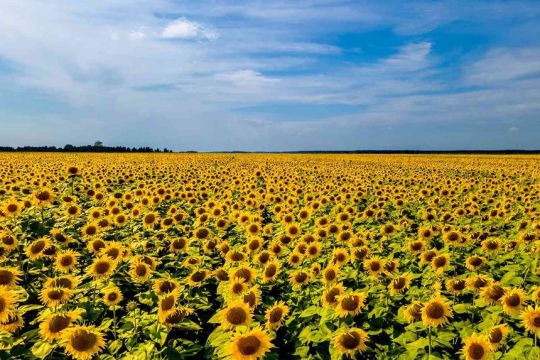

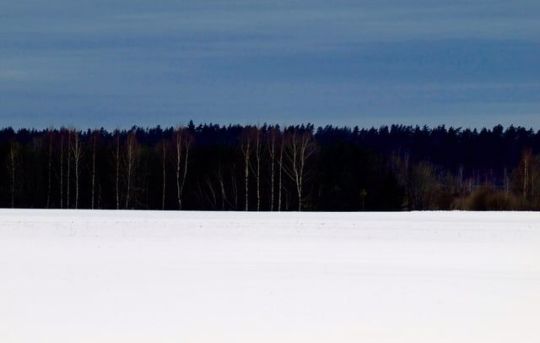
97K notes
·
View notes
Text
Ok! Redirecting from my plan for todays post (which was on effective horror so let me know if you still want that) because I got inspired by thinking about magic users again.
No matter how you picture your magic users it is important to give credence to the history of the art form. Regardless of how old your world is, take the time to think about the space your magic has inhabited and how it has changed in that time. Be it a form of art, science, or an innate survival tool it had to start somewhere and it has to have changed and grown.
Think about paintings from 100 years ago, then 200 years ago, keep going backwards and when you hit the era of cave paintings youll see that art has changed, abstract, portraiture, brush techniques, brush materials, if there even was a brush. So translating this to magic:
• spell casters used to use their hands instead of staves and to do so is more complicated but still can be done
• sorcerers only learned how to make illusion magic recently and as such there are way less spells in that particular school
• wizards argue about the wand techniques of the 3rd era vs the modern techniques and what is supperior
Now lets look at history. Magic in your world comes from somewhere, but in order for people to wield magic someone (or a thousand someones around the globe with different cultures and beliefs) has to have been the first to realize they have it. In the modern this can mean a lot of things:
• finding ancient scrolls that depict a form of magic that fell out of prevelance
• ancient wizard towers or schools full of tools mages can’t identify yet
• magicians who solely focus on teaching or learning about the first magic user(s) and seeing how much they actually learned
Your setting has a past and the past can be forgotten, either through conquest or the ever corrosive march of time. Write your magic with a story, even if it doesnt get explored in your writing or your ttrpg, those are questions that can have answers and those answers can lead to really interesting problem solving. Magic might be akin to nuclear physics in your world, something so abstract and dense to the average person that they cant even fathom it; but someone has to be Newton and someone has to be Oppenheimer. If magic is an art and its known by its people, what magician is your Picasso and who is your Peeters and how did both of them contribute to the art of magic.
7 notes
·
View notes
Photo
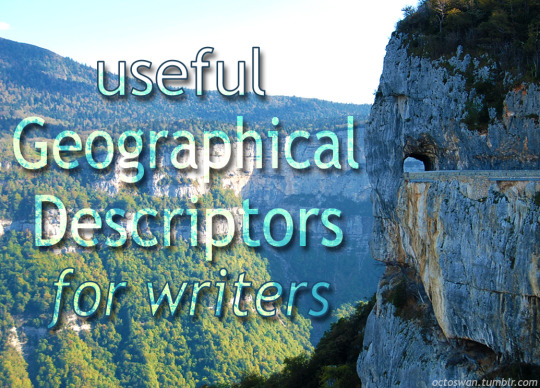
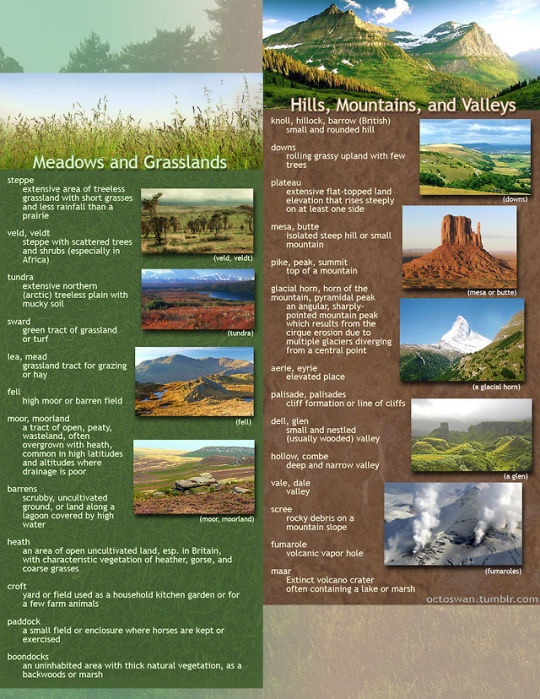
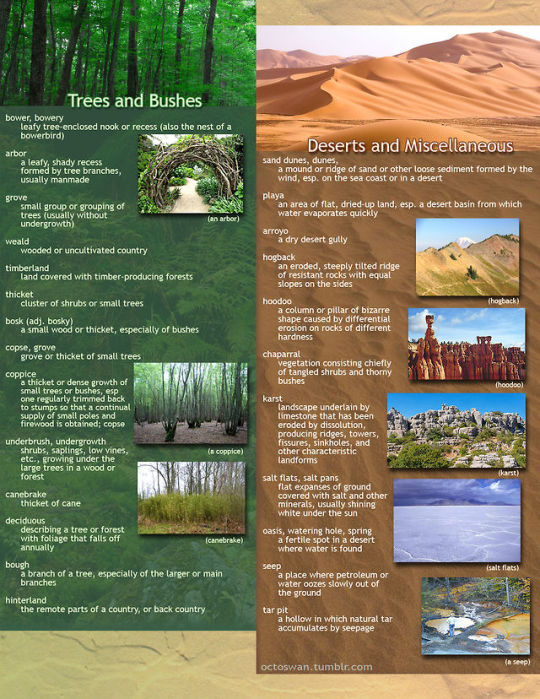
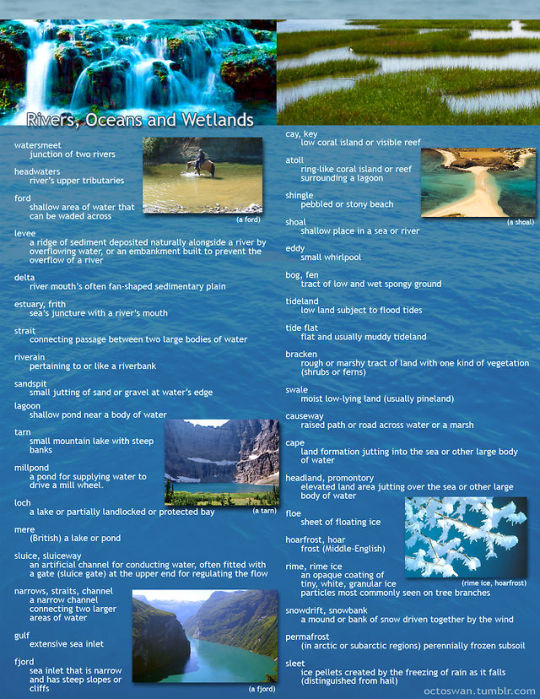
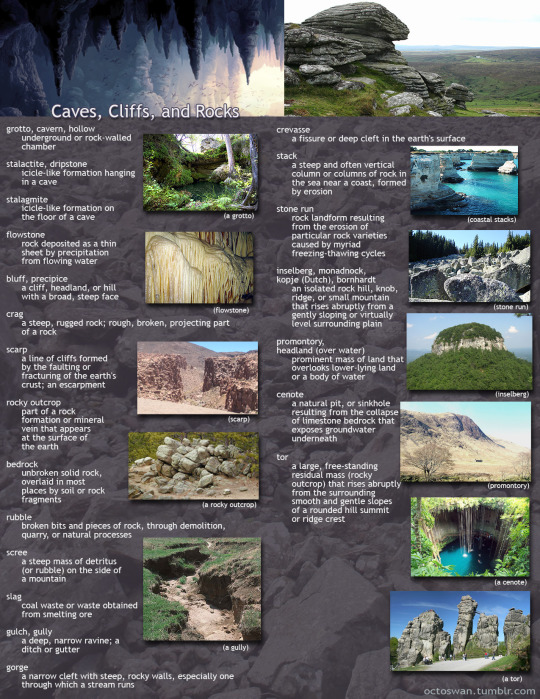
I made these as a way to compile all the geographical vocabulary that I thought was useful and interesting for writers. Some descriptors share categories, and some are simplified, but for the most part everything is in its proper place. Not all the words are as useable as others, and some might take tricky wording to pull off, but I hope these prove useful to all you writers out there!
(save the images to zoom in on the pics)
216K notes
·
View notes
Text
Ok! Since the last posts were about Mages and Thieves I suppose I should round out the RPG trifecta.
War, and the story of a soldier are something I am very comfortable writing but often fall in to pitfalls with. The traditional fantasy soldier, be it a knight, swordsman for hire, or simply a town guard is often treated as one point on a wildly large spectrum. A soldier is either John Wick with a sword or an absolute novice that exists as kill fodder. This most often comes from narrative interest:
• a swordswoman who dances with blades and can drop 12 men in the time it takes one to draw his blade
• the bumbling frightened soldier who dies in the first 6 minutes of a battle
• a knight who has never been bested and uses her sword so elegantly and gracefully
• a town guard who doesnt even know where his sheathe is on his belt
These are decent troupes but in the end I think it often falls to the wayside of more grand narratives.
A soldier in a medieval context was often a conscript, but once they found themself in the employ of the crown a great many became soldiers for hire. These people werent exceptional soldiers in most cases but to survive more than 5 battles in your life you tend to pick up a trick or two.
Combat is a personal thing, the way a soldier fights even if trained in a specific style by a single teacher they will always have their own flavor to it. I think here is where you can write the distinction.
• a swordswoman who kicks dust at her opponents to blind them, and kicks out their knees so they cant fight back
• a soldier who never learned how to use his shield so he dies to an arrow when the battle begins
• a knight who tends to misdirect her opponents with feints and rapid adjustments
• a townguard whos never used his sword so he doesnt know how to draw it without getting it stuck.
These things keep the gravity of a scene the same as it was but it gives more of an explanation to your warrior. Is she a fair fighter, if so how has she survived this long. Is he a dirty fighter, when did he learn that honor doesnt win wars. Are they a novice, what details of their technique are they trying to improve on.
No one makes a life in soldiering without first surviving combat, and no one in any fight is 100% perfect in their execution.
5 notes
·
View notes
Text
Small fantasy worldbuilding elements you might want to think about:
A currency that isn’t gold-standard/having gold be as valuable as tin
A currency that runs entirely on a perishable resource, like cocoa beans
A clock that isn’t 24-hours
More or less than four seasons/seasons other than the ones we know
Fantastical weather patterns like irregular cloud formations, iridescent rain
Multiple moons/no moon
Planetary rings
A northern lights effect, but near the equator
Roads that aren’t brown or grey/black, like San Juan’s blue bricks
Jewelry beyond precious gems and metals
Marriage signifiers other than wedding bands
The husband taking the wife's name / newlyweds inventing a new surname upon marriage
No concept of virginity or bastardry
More than 2 genders/no concept of gender
Monotheism, but not creationism
Gods that don’t look like people
Domesticated pets that aren’t re-skinned dogs and cats
Some normalized supernatural element that has nothing to do with the plot
Magical communication that isn’t Fantasy Zoom
“Books” that aren’t bound or scrolls
A nonverbal means of communicating, like sign language
A race of people who are obligate carnivores/ vegetarians/ vegans/ pescatarians (not religious, biological imperative)
I’ve done about half of these myself in one WIP or another and a little detail here or there goes a long way in reminding the audience that this isn’t Kansas anymore.
41K notes
·
View notes
